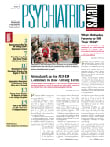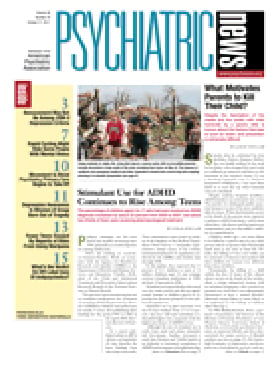Families for Depression Awareness reaches out to families and businesses to prevent the very tragedy that spurred its founder to create the organization.
Julie Totten, M.B.A., came to her cause in the wake of her brother's suicide 20 years ago.
"He was depressed and withdrawn, but his doctor didn't pick up what was wrong," she said. Totten had her fears but didn't know what to do. When her father began talking about suicide after her brother had killed himself, she didn't wait but persuaded him to seek treatment for depression.
"I went from tragedy with my brother to success with my father," she said.
In both cases, she wished she understood more about what was happening to her family. In response, she created Families for Depression Awareness, based in Waltham, Mass., to educate families of people with depression and anxiety.
Psychiatrist Scott Aaronson, M.D., has served on the organization's board since its founding.
"We're trying to fill a niche that is not otherwise filled," said Aaronson, now the director of clinical research programs at Sheppard Pratt Hospital in Towson, Md.
Speakers from families affected by mood disorders and trained by Families for Depression Awareness can address their peers, educate them about the illness and its treatments, and help them cope with their relatives' care, said Totten. The organization also provides a variety of printed and online information.
One tool is the "Family Tree," a Web-based form that helps a family gather a history of psychiatric diagnoses and mental health-related behaviors, even if the latter were only symptomatic and subsyndromic.
While a clinician gathers the same information, Totten believes that when relatives describe for themselves the behaviors as well as the diagnoses of members of their extended family, they begin to see patterns and understand the heritability of illness.
"Families love it," she said. "They realize that depression or other mental illness in their child or spouse is not their fault. They feel they're off the hook."
Aaronson agreed. The family tree was developed because perhaps two-thirds of people with depression have a family history of the illness, he said. "Building the tree can also help clinicians when it is combined with data about how other family members have or have not responded to specific treatments."
Families for Depression Awareness has also looked at the workplace as a likely venue to encounter family members needing its educational resources.
The organization works with the American Psychiatric Foundation's Partnership for Workplace Mental Health to bring a one-hour webinar to large corporations and thousands of their employees.
"Our program runs through human-resources managers," said Totten. "We present the business case to them first and explain the costs of mental illness: absenteeism, medical costs, disability leave, and so on."
Then they present the webinar, demonstrating the link between stress and depression and anxiety. That is followed by training for human-resources teams on coping strategies for stress and depression and suggestions for ways to get help through an employee assistance program or the company's health insurance program.
This kind of training goes a long way to destigmatizing mental illness and its treatment, she noted. "If you don't train them, they won't bring it up."

